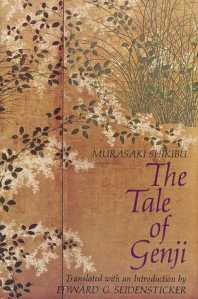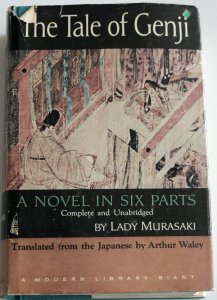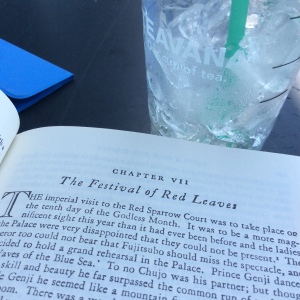 Well, I’ve done it. I’m well into my Big Book of the Summer, Murasaki Shikibu’s The Tale of Genji, a stunning eleventh-century Japanese classic, which is sometimes billed as the first novel (though the Greeks and Romans actually were first.). Murasaki Shikibu, an elegant writer who served in the court of the empress Akiko after she was widowed, entertained both the empress and emperor with parts of The Tale of Genji, her absorbing story of the amorous adventures of Genji, the son of the Emperor and his concubine. At this point I haven’t gleaned enough about the culture to understand exactly how Murasaki views her characters, though I appreciate the subtlety with which she shows the women do not always find his advances acceptable. In one chapter, after Genji is repeatedly rejected by the woman he is courting, he accidentally climbs into bed with the wrong lady but gallantly pretends she is the one he wanted. In another chapter, he courts a reclusive princess simply because she never sees anyone, and then rejects her because he finds her unattractive and unstylish. In a very disturbing scene, he mocks the unattractive princess and makes fun of her red nose to a little girl he is raising.
Well, I’ve done it. I’m well into my Big Book of the Summer, Murasaki Shikibu’s The Tale of Genji, a stunning eleventh-century Japanese classic, which is sometimes billed as the first novel (though the Greeks and Romans actually were first.). Murasaki Shikibu, an elegant writer who served in the court of the empress Akiko after she was widowed, entertained both the empress and emperor with parts of The Tale of Genji, her absorbing story of the amorous adventures of Genji, the son of the Emperor and his concubine. At this point I haven’t gleaned enough about the culture to understand exactly how Murasaki views her characters, though I appreciate the subtlety with which she shows the women do not always find his advances acceptable. In one chapter, after Genji is repeatedly rejected by the woman he is courting, he accidentally climbs into bed with the wrong lady but gallantly pretends she is the one he wanted. In another chapter, he courts a reclusive princess simply because she never sees anyone, and then rejects her because he finds her unattractive and unstylish. In a very disturbing scene, he mocks the unattractive princess and makes fun of her red nose to a little girl he is raising.
So what are we to think of Genji? My reading will gradually reveal more, I am sure.
Why am I reading this? The gorgeous language. Genji and his girlfriends exchange poems. It is delightful to read them. As for the beautiful language of Murasaki’s prose, it’s like being in an opium den, not that I’ve ever been in one, where language flows over and around you like smoke and you go into a dream and you aren’t aware of anything else I hope I’ll eventually understand the tradition of the Japanese romance better.
Meanwhile I am fascinated by Murasaki’s life. In Diary of Murasaki, she tells us about learning Chinese, though women did not study languages.
When my brother Nobunori was a boy my fahter was anxious to make a good Chinese scholar of him, and often came to hear Nobunori’s lessons. On these occasions I was always present, and so quick was I at picking up the language that I was soon able to prompt my brother whenever he got stuck. At this my father used to sigh and say, “If only you wore a boy how proud and happy I should be.
But she learned to conceal her knowledge of the least Chinese character, because she was told it would make her unpopular with men..
Sound familiar?
Being a girl, I meant so little to my father that he confronted me when he saw my name in the newspaper on the honor roll. “We didn’t think you did well,” he said.
I didn’t bother to correct him. I was numb from years of put-downs and insults. Yes, I was an honors student, I said blandly. I knew it made him angry. All my life he had talked a lot of garbage like “Women can’t play chess,” “Women can’t do math.” I once sassily said, “Not ‘can’t” but “refuse to.'” Certainly he didn’t understand my interest in languages and literature. And he didn’t give me any of the money from my so-called college fund until my last semester of college, after I had paid for my education through part-time jobs and small loans and was finally exhausted. Turned out I wouldn’t have had to take any loans. Great to know at the end of school, right? But never fear, I paid back my loans with no problem. School was not expensive in those days.
 When we talk about Genji, we don’t think of the weight of the book. But if you want to carry it on the bus or your bike, you should know that the oversize 1,090-page Knopf paperback of Edward G. Seidentsticker’s 1976 translation weighs three pounds.
When we talk about Genji, we don’t think of the weight of the book. But if you want to carry it on the bus or your bike, you should know that the oversize 1,090-page Knopf paperback of Edward G. Seidentsticker’s 1976 translation weighs three pounds.
I thought I could solve my summer-reading-on-the-go problem if I found a less hefty copy. It turns out the 1960 Modern Library copy of Arthur Waley’s original translation weighs only two and a half pounds. I figured it wouldn’t break the bike pannier.
Wrong!
The bike can’t even stand up with this book in the bag. The pannier came unhooked from the rack! I had to stop a couple of times and fix it.
Once at the coffeehouse, I had a few problems because of the translations. Reading the Seidensticker at home, I was introduced to the character Tayu, “a very susceptible young lady who was in court service and from time to did favors for Genji.” She distracts him from his pining for a governor’s wife with the story of a reclusive princess fathered by the late Prince Hitachi in old age. But in Waley’s translation she is called Maubo: her whole name , it turns out, is Taifu no Mayubo. Thank God there is a list of characters at the front.
And then there are the coffeehouse umbrella problems.
On the terrace, in the bright 80-degree sun, there were several tables but only one umbrella. The umbrella shaded one table. And so I huddled at the table behind it, which at least caught a little triangle of shade. And then the guy moved the umbrella so the girl had more shade. And then I had no shade. Very exasperating, but what can you do? Start a coffeehouse war? I don’t think so. The minute a slightly shady table opened up I was there!


The weight of books is very, very relevant – I had to think carefully about what I took to London recently, and the very restrained amount I bought still weighed me down! As for translations – such a vexing issue. I think I’m just going to settle in future for the one that sounds best to me and go with that!
LikeLike
Yes, light is better for on the go. I may have to replace my bike pannnier. I think it is important to read the translation that’s in the style we like. Everyone loves Ferrante, and her translator Ann Goldstein is an extremely smooth writer. Without her, what would we have?
LikeLiked by 1 person
I call those heavy books “bricks”. Bleak House, for example, is a brick. You need a multi-volume edition, or — dare I speak it! — put it on your Kindle. I enjoyed War and Peace so much more because I have a two-volume version.
LikeLike
Oh, a multi-volume edition would be perfect! Well, these two bricks will have to do. I’ll have to be very brave if I decide to lug it around again.
LikeLike
I stick with real books. It’s just not as meaningful an experience; it announces itself as transitory; I want to flip back and forth, make notes, know where I am, I enjoy the whole feel of a book from its cover to possible illustrastions. One solution for large books is to buy a more expensive version: say a 2 volume the way “Silver Season” suggests.
But this is a side issue — what an interesting wonderful blog. I loved the parallel you drew from your own life to show how what we see in Genji’s tale is utterly with us today. I found I didn’t have the patience (in my view) to wade through all the descriptions of etiquette and arguments about manners and what to do here or there, and found the coldness of the way people approached one another as a matter of course numbing. I wished the narrator had not been complacent and accepted it — but then I realize now that if she had, would she have written this book in quite this way. I didn’t know about the Diary; I assume that illuminates this first woman’s novel.
And ending on the scene in the bookshop was perfect for your theme. How the selfishness and indifferences of social life impinge on those of us living true inward lives with other beings in other worlds too. That’s a mirror of your book.
I’ve not started on my summer book, but rather my summer project, and soon will write about Charlotte Smith’s letters, another vast heavy book. It’s in hardback so cannot be carried on a bike at all.
LikeLike
I love my e-books, but some things are much better read as books. This one requires a real book, I think. It feels somehow more “real.” And yet it’s the Japanese who were writing cell phone novels, so I obviously don’t understand Japanese culture.
I am beginning to pay more attention to the responses of women to Genji and think Murasaki criticizes him through these objections (more than you would think!). Yes, it’s crazy not to be able to share the umbrella, but why was there only one anyway? It’s not well-thought out.
LikeLike
Living in the country, I only go to the coffee house in winter. In summer it’s my backyard with a glass of lemonade or mug of tea, depending on the weather. I’m going to look at this book. My summer reading is “books in translation” which right now is Mikail Sholokov and Emile Zola with Alexander Dumas tossed in for fun.
LikeLike
Oh, your summer reading sounds wonderful! I’m more comfortable with the nineteenth century than the eleventh, but Tale of Genji is strange and fascinating.
LikeLike